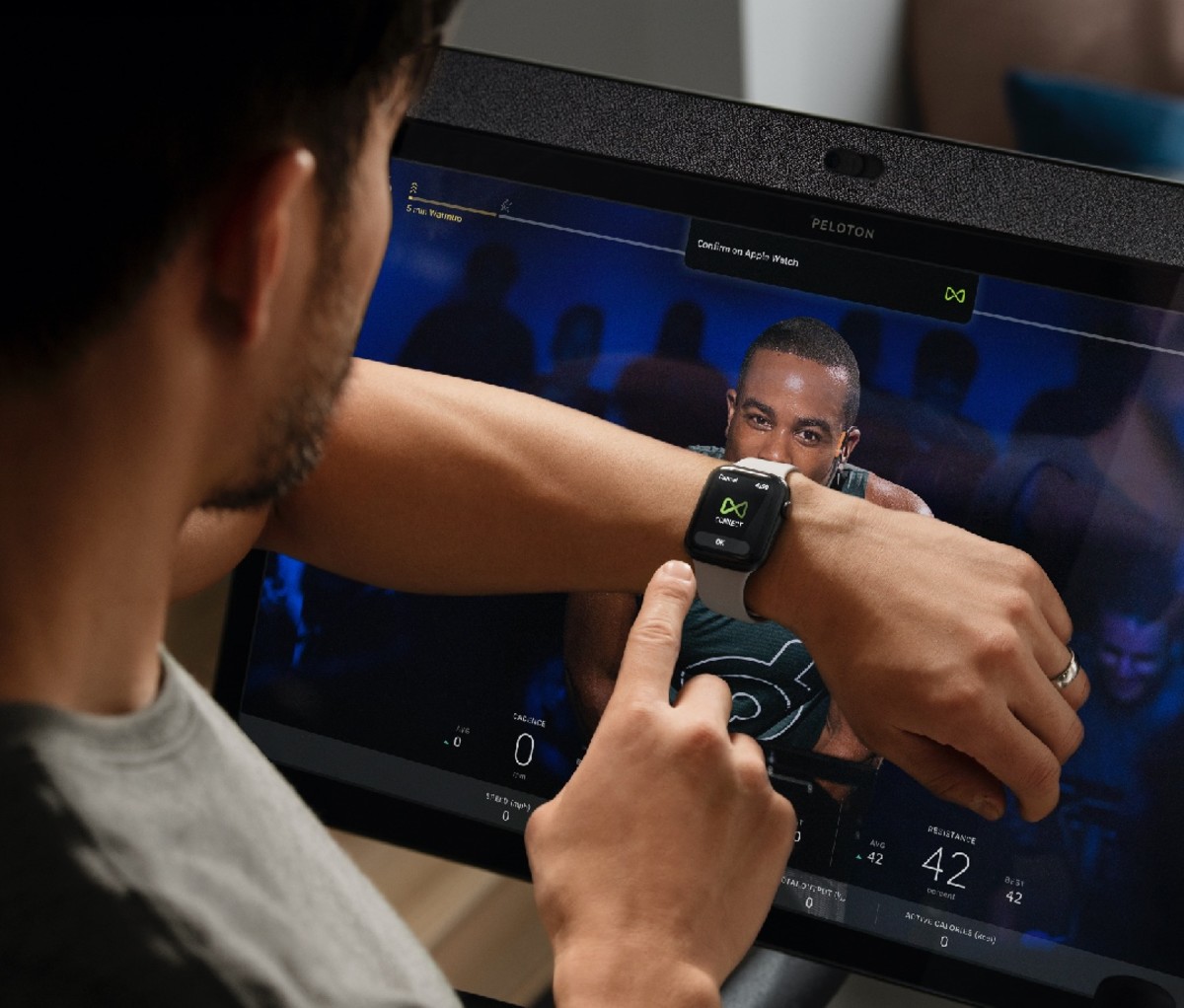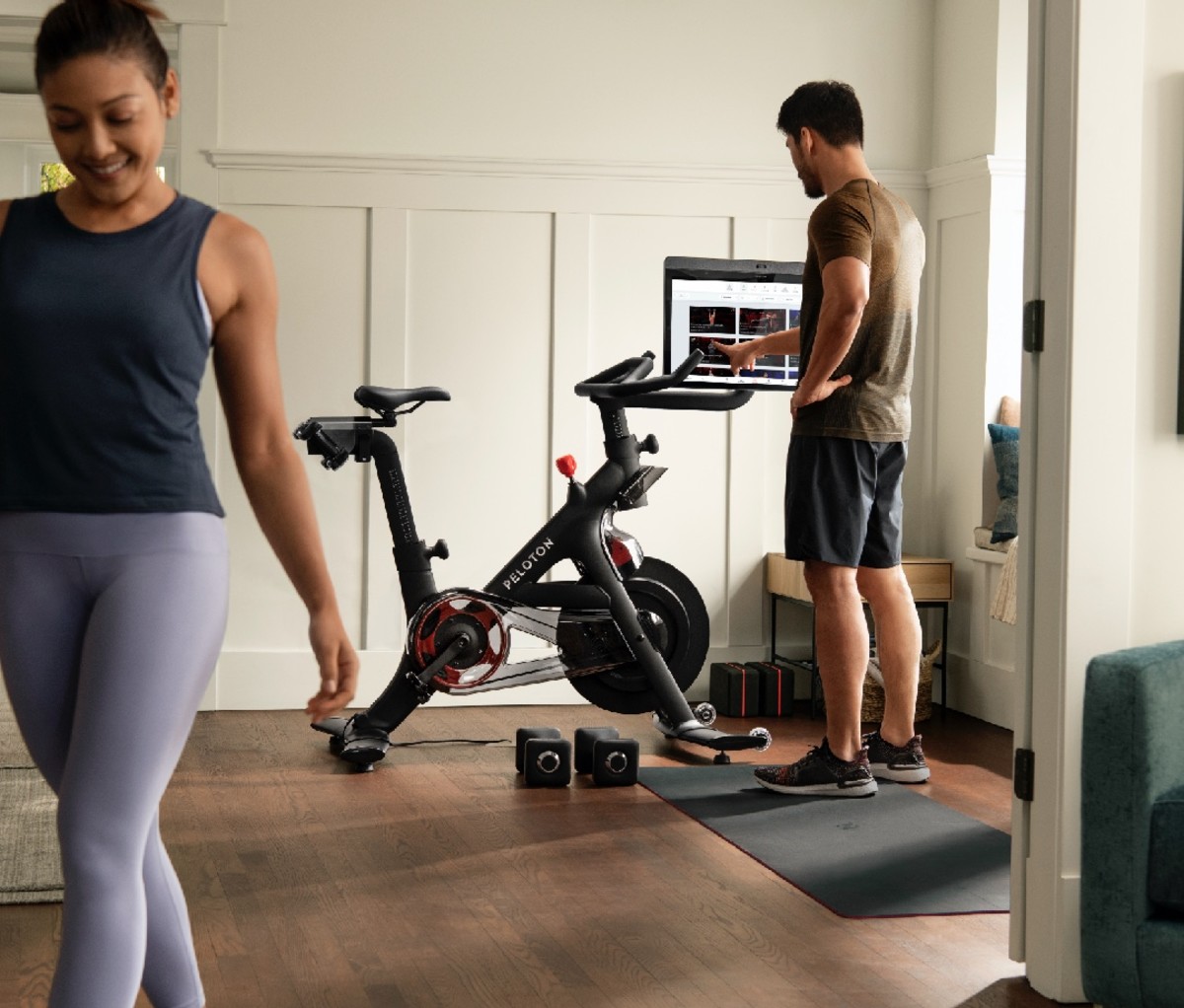On Tuesday, I went to the butt museum. On Friday, I went to the club. And by Sunday, I was in the Caribbean. How does that work in a pandemic? I’m alone in my living room on a Peloton Bike+, and I’m having the time of my life. Desperate times, you say? In a way, yes, but saddling up on this machine—smiling at instructors’ affirmations, acquiescing to their challenges to achieve “glazed donut status” STAT, huffing in my Brooklyn walkup as passersby on the street see me maniacally spinning—has brought me a lot of joy, and kicked my ass far more than I anticipated over the last four months.
You probably clicked on this because you’re looking to invest in cardio equipment for your home gym. Stationary bikes might be firmly hedged in your mind as being both female oriented and dominated. But trust me, the newest offering from Peloton expertly blends cardio and strength. In a market that’s getting exceedingly saturated with smart home gym equipment, the Peloton Bike is a workhorse that sidesteps trendy, flashy gimmicks and works well for families; its power lies in its accessibility and versatility. There’s practically no learning curve to spin workouts (a downfall of indoor rowers), and anyone at any age and skill level can give it a go (your pregnant wife, aging father, hyperactive teen looking to blow off some steam).

The Logistics: Peloton Bike V Bike+
If you want to make your bike do double duty, level up to the Bike+. It has the same class offerings as the Bike, but there are some key mechanical differences. Bike+ sports a 23.8” HD touchscreen that rotates 180 degrees for total visibility, which means you can transition seamlessly. Swivel the screen from in-the-saddle climbs to on-the-floor exercises during bootcamp classes. The OG Bike’s screen is immobile, so you can only listen to the instructor if your workout space isn’t big enough to put your mat to the side or behind the bike (or AirPlay the workout onto your TV).
The high-fidelity sound system comprises four speakers to amp up the immersive experience. If you like to train at night, turn off the lights to replicate a studio class. If music is big for your motivation, this is a major plus; you can customize the audio feature to prioritize music or the instructor. The belt drive is whisper quiet, so if you’re the type to sweat at 5 a.m. before the rest of your family or roommates are up, the only sound they’ll hear is your labored breathing and the clip-clop of your cycling shoes against hardwood if you forget your headphones in the next room (for the umpteenth time).
Bike+ lets you pair your Apple Watch by tapping it to the screen via the Gymkit feature, a great way to monitor your heart rate in real time. But the biggest impetus to pony up and buy the Bike+, in my opinion, is the optional auto-follow system available during on-demand classes. Press the “lock” icon next to the resistance, and the machine automatically adjusts your resistance so you can put all your energy into exorcising your inner demons and burning out your quads.
The Experience: Are Peloton Workouts Really That Good?
I’ll admit I was surprised by the intensity and variety of workouts, but before I delve into that—a little background on my fitness experience. After all, why take my word for it? I started as a track and field athlete, then pivoted into strength training post-college, really leaning into HIIT and strength training, until I stumbled into triathlons and dabbled in one grueling 155-mile mountain bike tour across Africa. I’m no stranger to endurance work, EMOMs, interval training, and like to commit to a 50/50 split between cardio and strength. I dove into all the Peloton offerings to get a feel for how efficacious the workouts are, and gleaned some tips to maximize the experience. Here’s how to make the most of your Peloton Bike or Bike+.

1. Use the Filters
Instead of just cherry-picking from the newest classes, use the filters to streamline the entire library of workouts based on your day’s goal. If you’re well-recovered, go one of two ways: 30 minutes and under HIIT and hills (filter with “Intervals”) or 45 and over endurance (filter with “Power Zone”). A 30-minute session will be a high-octane effort that ebbs and flows between hitting close to your max heart rate and recovering, while endurance will keep you pretty squarely in the 60 to 70 percent of your max heart rate for longer durations.
Write out a weekly program for yourself so you get a mix of workouts that caters to your needs and builds in enough diversity and rest/recovery to prevent burnout. Also pay attention to the color-coded tags indicating beginner, intermediate, and advanced skill levels.
Here’s what a sample week might look like if you’re intermediate to advanced:
- Monday: 30-Minute HIIT & Hills Ride (with Olivia Amato)
- Tuesday: 45-Minute Full-Body Strength (with Andy Speer, Rebecca Kennedy, or Adrian Williams)
- Wednesday: Rest day
- Thursday: 45-Minute Endurance Ride or 45-Minute Pro Cyclist Ride (with Christian Vande Velde)
- Friday: 20-Minute Low Impact (with Emma Lovewell)
- Saturday: 60-Minute Full-Body Bootcamp (with Jess Sims)
- Sunday: Recovery day: 20-Minute Walk + Run (With Matty Maggiacomo), 20-Minute Full-Body Stretch (with Rebecca Kennedy), or 20-Minute Restorative Yoga (with Denis Morton)
2. Keep Trying New Instructors
You might not want to admit that music dictates who you like to ride or train with, but it’s a huge part of the experience. Peep the playlist, filter by music genre, or select specific themed rides like Club Bangers, Wyclef Jean Ride, Classic Rock, or 80s Ride. Every instructor has a different motivating style. If you want something light and breezy on the bike, Cody Rigsby’s funny as hell. If you need a good walloping via bootcamp, Jess Sims is a tough-love guru who’s frank but insanely motivating sans the rah-rah enthusiasm you might be averse to. Want to learn more about technique for strength training, Andy Speer and Rebecca Kennedy are nit-picky in the best way. By trying new trainers, you’ll expose yourself to different training techniques and see what rouses you to dig deeper: spiritual enlightenment, a rowdy playlist, or an instructor who stays in the trenches with you.
Also, don’t shy away from repeating classes. Try to beat your best power output on the bike; and for strength and bootcamp classes, jot down how many rounds you complete during AMRAPs (as many rounds as possible), and how many reps you do of a specific exercise during EMOMs (every minute on the minute).
3. Stack Your Workouts
The best way to ensure you actually warm up, cool down, and/or stretch is by “stacking” your workouts. This new feature lets you sandwich classes together ahead of time, nixing the down time of browsing. The more time you spend hemming and hawing over what core workout to do as your finisher, the smaller your odds are of actually doing it.
4. Enlist an Accountability Buddy
Just because you’re on a stationary bike doesn’t mean you can’t have a training partner. In lieu of doing laps in a park, set up a time to do live or on-demand workouts together. You can send high-fives and video chat each other during or at the end of a grueling session. Sometimes that camaraderie (or external pressure) is all you need to show up on the mornings you’d rather hit snooze or afternoons you’d rather spend on the couch with an IPA.
Alternatively, you can join certain Tags (like that of your alma mater) to connect with members who have shared interests and, of course, scratch your competitive itch via the leaderboard. But if you need the extra kick in the seat to saddle up, find friends who own a Peloton (you can search Facebook connections on the bike) and ride together. They say misery loves company, but there’s nothing miserable about riding together—while apart.
Bike+, $2,495; peloton.com
Get itfrom Men's Journal https://ift.tt/3siQU34



No comments:
Post a Comment